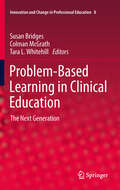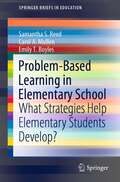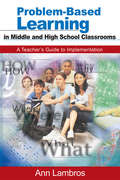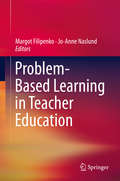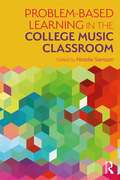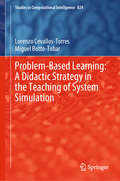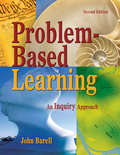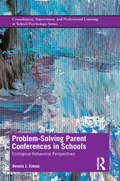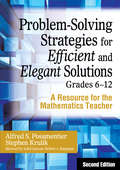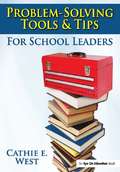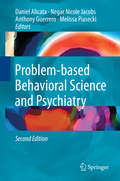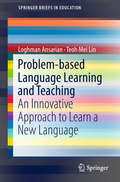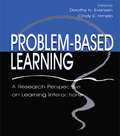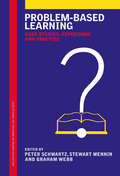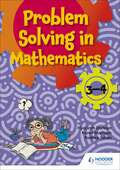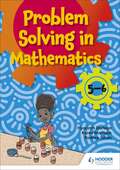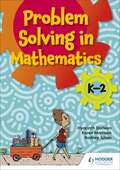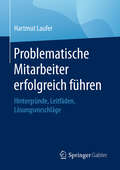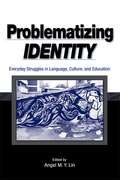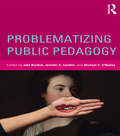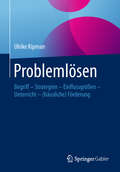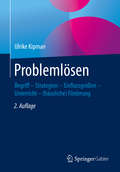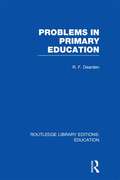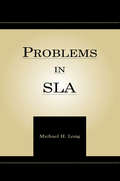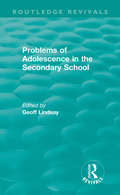- Table View
- List View
Problem-Based Learning in Clinical Education: The Next Generation
by Susan Bridges Tara L. Whitehill Colman McgrathDeveloped in the context of health sciences education in the late 1960s, problem-based learning (PBL) is now widely deployed as an education methodology. Its problem-solving, collaborative, student-centred ethos is seen as a more appropriate system of pedagogy than earlier 'chalk-and-talk' modes. Focusing on its use in clinical education, this collection of recent scholarship on PBL examines the ways in which PBL is both conceived and implemented in clinical education. The work has a dual emphasis, research-driven on the one hand, while on the other assessing new methodologies to explore how problem-based curricula support the achievement of students' learning outcomes in the context of clinical education. The chapters draw on studies that explore PBL both theoretically and empirically. The volume's eclecticism capitalises on the growing body of empirical research into PBL evaluations. It balances this with studies analysing the relatively new area of discourse-based research on PBL-in-action, whose focus has been to interrogate the 'how' of student learning in curricula with PBL content.This publication will be of interest to clinical teachers, curriculum designers and those interested in innovations in the scholarship of teaching and learning in PBL curricula.
Problem-Based Learning in Elementary School: What Strategies Help Elementary Students Develop? (SpringerBriefs in Education)
by Carol A. Mullen Samantha S. Reed Emily T. BoylesThis book addresses Problem-based Learning (PBL) in elementary schools and reveals how this can promote elementary students’ development in critical thinking, creativity, communication, collaboration, and citizenship, also known as the 5 Cs. Through teachers’ interviews, the book explores which PBL strategies promote skills and knowledge gains when students collaboratively investigate authentic open-ended problems. It also uncovers peer-to-peer relational learning and other strategies used in PBL classrooms, and it examines their importance to public education. The book paints a lively picture of student-centered learning, drawing upon frameworks, best practices, experiences, processes, strategies, and research results. Firsthand accounts of best practices in PBL instruction connect this pedagogy to theory, research, practice, and policy. It explores teacher instruction in the early years of schooling that purposefully fosters student-centered learning, real-world relevance, and collaboration in accordance with capacities expected of successful 21st century graduates. This book supports the implementation of PBL in elementary schools and promotes increased student engagement and achievement, as well as college and career readiness. This book is of interest to practitioners seeking information about PBL pedagogies for elementary grades, such as teachers, teacher mentors and trainers, (school) leaders, and policymakers, as well as anyone interested in pedagogic strategies that advance critical thinking, creativity, communication, collaboration, and citizenship capacities.
Problem-Based Learning in Middle and High School Classrooms: A Teacher's Guide to Implementation
by Dr Marian Ann LambrosLambros gives teachers all the tools they need for PBL instruction to boost reading comprehension, social skill development, content retention, and student motivation.
Problem-Based Learning in Teacher Education
by Margot Filipenko Jo-Anne NaslundThis book offers readers a comprehensive understanding of problem-based learning (PBL) in teacher education. Featuring the perspectives of experienced teacher educators, it details the strengths of problem-based learning pedagogy as well as identifies continuing challenges and future possibilities. The book explains the goals, content, processes and strategies of a successful and longstanding problem-based learning teacher education program at the University of British Columbia. It features contributions from tutors, faculty, school administrators, faculty advisors, school advisors, librarians and pre-service teachers who share their perspectives about problem-based learning as a robust and exciting approach for teaching and learning. Overall, the contributors to the book discuss the history of the program, its implementation and future directions. In the process, readers discover the ways that problem-based learning has succeeded in preparing educators to teach diverse learners and acquire the professional dispositions necessary for teaching in today's multilingual/multicultural classrooms.
Problem-Based Learning in the College Music Classroom
by Natalie R SarrazinProblem-Based Learning in the College Music Classroom explores the core tenets of Problem-Based Learning (PBL). PBL is an effective, student-centered approach in which students learn higher-order thinking skills and integrative strategies by solving real-world challenges - not often employed in music classrooms. Yet such courses are uniquely situated to advance this innovative pedagogical approach. This volume sheds light on PBL best practices in survey- and topic-based music courses while integrating general education content, discussing implementation, materials, methods, and challenges, and encouraging readers to think creatively to develop flexible solutions for large-scale issues. Bookended by introductory and concluding chapters that delve into the history, theory, application, and assessment of PBL, the text collects classroom-tested case studies from eleven contributing authors in: Music History and Appreciation Ethnomusicology Music and Movement Music Theory and Education Problem-Based Learning in the College Music Classroom paves the way for pedagogical discovery in this unexplored area, encouraging teachers and graduate students to move curricula goals forward - and ultimately to move students toward innovation and engagement.
Problem-Based Learning: A Didactic Strategy in the Teaching of System Simulation (Studies in Computational Intelligence #824)
by Miguel Botto-Tobar Lorenzo Cevallos-TorresThis book describes and outlines the theoretical foundations of system simulation in teaching, and as a practical contribution to teaching-and-learning models. It presents various methodologies used in teaching, the goal being to solve real-life problems by creating simulation models and probability distributions that allow correlations to be drawn between a real model and a simulated model. Moreover, the book demonstrates the role of simulation in decision-making processes connected to teaching and learning.
Problem-Based Learning: An Inquiry Approach
by John F. BarellA step-by-step guide for teaching your students to think critically and solve complex problems! Problem-based learning expert John Barell troubleshoots the PBL process for teachers, drawing from practical classroom experience. Step-by-step procedures make this remarkably effective teaching model accessible and highly doable for all teachers, from beginners to veterans. This standards-based, teacher-friendly second edition of the author's popular PBL guide includes: Examples showing problem-based learning in action Answers to frequently asked questions on standards-based implementation Thorough guidelines for developing problems for students to solve Rubrics and assessment tips to ensure that standards are met
Problem-Solving Parent Conferences in Schools: Ecological-Behavioral Perspectives (Consultation, Supervision, and Professional Learning in School Psychology Series)
by Dennis J. SimonProblem-Solving Parent Conferences in Schools presents a Problem-solving Parent Conference (PPC) model that integrates and applies empirically-supported systemic and behavioral intervention strategies to coordinated home-school interventions for student behavioral and social-emotional concerns. Though today’s schools seek to further understand student behaviors from ecological and systemic perspectives, there are limited resources available on how to effectively collaborate with families—a key social-environmental context. This unique book engages parents and teachers in a five-stage protocol towards more effective student support. These evidence-based, change-oriented approaches will be essential for graduate students in school psychology, school social work, and school counseling programs; in teacher preparation; and in any related course focused on parents and families in school settings. Its resources are also critical for mental health practitioners who work with children, adolescents, families, and schools.
Problem-Solving Strategies for Efficient and Elegant Solutions, Grades 6-12: A Resource for the Mathematics Teacher
by Alfred S. Posamentier Stephen KrulikThis updated edition presents ten strategies for solving a wide range of mathematics problems, plus new sample problems.
Problem-Solving Tools and Tips for School Leaders: Tools And Tips For School Leaders
by Cathie WestIn this book, award-winning educator Cathie West teaches readers how to confidently prepare for and respond to the challenges that come with being a school leader. Derived from professional experience and extensive research, the strategies can be put to work exactly as described or adapted to fit the unique situations that educators face in their schools. With more than thirty years of experience as a school principal, West provides tips for teacher leaders striving to expand their skills, brand new administrators looking for guidance, and experienced principals confronting the unfamiliar or looking for fresh problem-solving ideas.
Problem-based Behavioral Science and Psychiatry
by Daniel Alicata Negar Jacobs Anthony Guerrero Melissa PiaseckiIn keeping with the growing emphasis on psychiatry in the medical school curriculum, problem-based learning (PBL) offers students a unique patient-centred, multidisciplinary approach to study and the synthesis of knowledge. The new 2nd edition of Problem-Based Behavioral Science and Psychiatry integrates DSM-5 updates and diagnostic criteria, and is fully consistent with PBL models and methods. Building on the strengths of the popular and widely downloaded 1st edition, the 2nd edition is a clinically robust resource for both the medical and the behavioral science student. Over 40 contributors, many themselves graduates of PBL medical schools, apply problem-based learning methods to specific psychiatric disorders, general clinical issues, and bedrock physician skills such as the intake interview and treatment planning. The book's fictional case vignettes illustrated typical patient scenarios, providing real-world context for content areas, and accompanying case diagrams show the relationships between patient behaviour and underlying neurobiological structures. Each student-friendly section ends with helpful review questions. A sampling of the content areas covered: · Childhood development and brain development. · Major psychiatric illnesses, including personality, mood, anxiety, and psychotic disorders. · Stress, substance abuse, and violence. · Eating, sleep, and sexual disorders. · Coping skills and treatment compliance. · End-of-life care. · PLUS chapters on cultural sensitivity, ethical concerns, and the physician/patient relationship. This book is ideal for first and second year medical students wanting to learn about psychiatry in the exciting context of realistic cases. It also makes an excellent prep/review text for third- and fourth-year medical students preparing for the USMLE Step 1 and 2 exams, as well as being suited to graduate students in psychology or clinical social work. Problem-Based Behavioral Science and Psychiatry encourages lifelong learning and helps build the foundation for a lifelong career.
Problem-based Language Learning and Teaching: An Innovative Approach to Learn a New Language (SpringerBriefs in Education)
by Loghman Ansarian Mei Lin TeohThis book investigates how problem-based learning can be implemented in language classes and how it can bring about a change in language learners' understanding of the foreign language. Based on empirical evidence, it provides readers with the theoretical background of this interdisciplinary approach in education, discusses the challenges that language teachers might encounter while implementing this approach in language classes, and offers procedures for employing the method. It also clarifies the difference between collaborative learning and problem-based learning in which certain dynamics are at work. It is of interest to researchers and instructors in cognitive learning, task-based language teaching, and content-focused courses.
Problem-based Learning: A Research Perspective on Learning Interactions
by Cindy E. Hmelo-Silver Dorothy H. Evensen Cindy E. HmeloThis volume collects recent studies conducted within the area of medical education that investigate two of the critical components of problem-based curricula--the group meeting and self-directed learning--and demonstrates that understanding these complex phenomena is critical to the operation of this innovative curriculum. It is the editors' contention that it is these components of problem-based learning that connect the initiating "problem" with the process of effective "learning." Revealing how this occurs is the task taken on by researchers contributing to this volume. The studies include use of self-reports, interviews, observations, verbal protocols, and micro-analysis to find ways into the psychological processes and sociological contexts that constitute the world of problem-based learning.
Problem-based Learning: A Workbook For Integrating Basic And Clinical Science (Case Studies Of Teaching In Higher Education)
by Peter SchwartzProblem-based learning (PBL) is becoming widely used in higher education. Popular in the medical sciences, PBL is now finding applications beyond - in engineering, sciences and architecture - and is widely applicable in many fields. It is a powerful teaching technique that appeals to students and educators alike. This book will be of great value to those who want to improve their use of PBL and for those who want to learn more and implement it. It provides compelling accounts of experiences with PBL from eight countries including the UK, US, Canada, Australia and New Zealand, and gives readers the opportunity to understand PBL and to develop strategies for their own curriculum, in any subject and at many levels.
Problem-solving 3-4
by Karen Morrison Hyacinth Dorleon Rodney JulienWe live in an increasingly technological and information-rich world. Education is focusingmore on enquiry and skills-based approaches. Students, even at the early levels ofschooling, are expected to develop a range of skills, including problem solving skills.Creative thinking, using information appropriately and problem solving are important for students in the school curriculum and in daily life. This book will help students learn how to apply mathematical skills in different contexts and explain how they got to their solutions.This book is easy for parents and teachers to use, and teaches multiple strategies forsolving problems, using challenging but supportive contexts. The approach is underpinnedby the Five E's approach to learning.The course will help student to:· Engage with problems meaningfully· Explore different options for approaching and solving problems· Explain how they are thinking· Elaborate on their working and processes and see connections between different areasof mathematics· Evaluate what worked and what didn't, learning from mistakes as well as successes
Problem-solving 5-6
by Karen Morrison Hyacinth Dorleon Rodney JulienWe live in an increasingly technological and information-rich world. Education is focusingmore on enquiry and skills-based approaches. Students, even at the early levels ofschooling, are expected to develop a range of skills, including problem solving skills.Creative thinking, using information appropriately and problem solving are important for students in the school curriculum and in daily life. This book will help students learn how to apply mathematical skills in different contexts and explain how they got to their solutions.This book is easy for parents and teachers to use, and teaches multiple strategies forsolving problems, using challenging but supportive contexts. The approach is underpinnedby the Five E's approach to learning.The course will help student to:· Engage with problems meaningfully· Explore different options for approaching and solving problems· Explain their thought processes · Elaborate on their working and processes and see connections between different areasof mathematics· Evaluate what worked and what didn't, learning from mistakes as well as successes
Problem-solving K-2
by Karen Morrison Hyacinth Dorleon Rodney JulienWe live in an increasingly technological and information-rich world. Education is focusing more on enquiry and skills-based approaches. Students, even at the early levels of schooling, are expected to develop a range of skills, including problem solving skills. Creative thinking and problem solving are not only important elements in the curriculum but they are also crucial in daily life. Students need to learn basic mathematical skills, but they also have to be able to apply these in unfamiliar contexts, communicate their thinking and explain how they got to their solutions. This book is easy for parents and teachers to use, and teaches multiple strategies for solving problems, using challenging but supportive contexts. The approach is underpinned by the Five E's approach to learning. The course will help student to: · Engage with problems meaningfully · Explore different options for approaching and solving problems· Explain how they are thinking· Elaborate on their working and processes and see connections between different areas of mathematics· Evaluate what worked and what didn't, learning from mistakes as well as successes.
Problematische Mitarbeiter erfolgreich führen
by Hartmut LauferDas Buch befasst sich mit besonderen Problemen bei der Mitarbeiterführung und zeigt, auf welchen Wegen ein partnerschaftlicher Umgang zwischen Führungskräften und Mitarbeitern gefunden werden kann.Auf der Basis aktueller psychologischer Erkenntnisse und seiner langjährigen Erfahrung als Führungskraft beleuchtet der Autor die Hintergründe problematischer Verhaltensweisen von Mitarbeitern und stellt praxiserprobte Führungstechniken und Kommunikationsinstrumente zur Bewältigung der damit einhergehenden Konflikte vor. Der Autor zeigt auf, wie Führungskräften in Mitarbeitergesprächen der schwierige Balanceakt zwischen der Wahrung der Unternehmensinteressen einerseits und der Fürsorgepflicht gegenüber Mitarbeitern andererseits gelingen kann. Daher widmet sich das abschließende Kapitel den besonderen Anforderungen, Risiken und Regeln, die bei problemspezifischen Mitarbeitergesprächen zu bedenken sind – unter anderem beim Kritikgespräch, Schlichtungsgespräch oder Trennungsgespräch. Für jede Art von Mitarbeitergespräch bietet der Band Checklisten und Leitfäden zur Anwendung im Führungsalltag.
Problematizing Identity: Everyday Struggles in Language, Culture, and Education
by Angel M. Y. LinThis book argues that identity as a term needs to be problematized, not taken for granted � for both the risks and the potential that the concept offers to educators for understanding issues of social inequality and how social inequality is being reproduced, and for exploring possible alternative ways educators can work with identity de/formation p
Problematizing Public Pedagogy
by Jennifer A. Sandlin Jake Burdick Michael P. O’MalleyThe term ‘public pedagogy’ is given a variety of definitions and meanings by those who employ it. It is often used without adequately explicating its meaning, its context, or its location within differing and contested articulations of the construct. Problematizing Public Pedagogy brings together renowned and emerging scholars in the field of education to provide a theoretical, methodological, ethical, and practical ground from which other scholars and activists can explore these forms of education. At the same time it increases the viability of the concept of public pedagogy itself. Beyond adding a multifaceted set of critical lenses to the genre of public pedagogy inquiry and theorizing, this volume adds nuance to the broader field of education research overall.
Problemlösen: Begriff – Strategien – Einflussgrößen – Unterricht – (häusliche) Förderung
by Ulrike KipmanProblemlösen gilt als eine der Schlüsselqualifikationen des 21. Jahrhunderts. Es geht beim Problemlösen nicht nur darum, Informationen sinnvoll zu vernetzen, dynamisch in Beziehung zu setzen, Wahrscheinlichkeiten zu berechnen und eine Kette richtiger Entscheidungen zu treffen, sondern auch vielfach darum, eine Vielzahl an Außenkriterien zu berücksichtigen und ein entsprechendes „Weltwissen“ an den Tag zu legen. Dieses Buch soll die Frage beantworten, wie man zu einem guten Problemlöser / einer guten Problemlöserin werden kann bzw. warum bestimmte Personen bei der Lösung von Problemen erfolgreicher sind als andere. Nach einer umfassenden Zusammenstellung der Literatur zu diesem Thema werden Einflussgrößen auf das Problemlösen analysiert und miteinander abgeglichen und Ideen für den Unterricht in der Primarstufe und Sekundarstufe I präsentiert. Zudem werden verschiedene Arten des Unterrichts im Hinblick auf die Wirksamkeit für unterschiedliche Personengruppen diskutiert, dies vor dem Hintergrund, dass nicht nur Problemstellungen stark variieren sondern auch die Problemlöser/innen. Eine Handreichung mit Brettspielen, die die Kriterien des Problemlösens erfüllen, ist ebenfalls Teil dieses Buches. Letztendlich wird ein Modell vorgeschlagen, welches erfolgreiches Problemlösen vielschichtig zu erklären versucht.
Problemlösen: Begriff – Strategien – Einflussgrößen – Unterricht – (häusliche) Förderung
by Ulrike KipmanProblemlösen gilt als eine der Schlüsselqualifikationen des 21. Jahrhunderts. Es geht beim Problemlösen nicht nur darum, Informationen sinnvoll zu vernetzen, dynamisch in Beziehung zu setzen, Wahrscheinlichkeiten zu berechnen und eine Kette richtiger Entscheidungen zu treffen, sondern auch vielfach darum, eine Vielzahl an Außenkriterien zu berücksichtigen und ein entsprechendes „Weltwissen“ an den Tag zu legen. Dieses Buch soll die Frage beantworten, wie man zu einem guten Problemlöser / einer guten Problemlöserin werden kann bzw. warum bestimmte Personen bei der Lösung von Problemen erfolgreicher sind als andere. Nach einer umfassenden Zusammenstellung der Literatur zu diesem Thema werden Einflussgrößen auf das Problemlösen analysiert und miteinander abgeglichen und Ideen für den Unterricht in der Primarstufe und Sekundarstufe I präsentiert. Zudem werden verschiedene Arten des Unterrichts im Hinblick auf die Wirksamkeit für unterschiedliche Personengruppen diskutiert, dies vor dem Hintergrund, dass nicht nur Problemstellungen stark variieren sondern auch die Problemlöser/innen. Eine Handreichung mit Brettspielen, die die Kriterien des Problemlösens erfüllen, ist ebenfalls Teil dieses Buches. Letztendlich wird ein Modell vorgeschlagen, welches erfolgreiches Problemlösen vielschichtig zu erklären versucht. In der 2. Auflage wurden alle Kapitel überarbeitet und an den neuesten Kenntnisstand zum Thema Problemlösen angepasst. Die Kapitel zur schulischen und häuslichen Förderung der Problemlösekompetenz wurden stark erweitert und es werden nun eine Vielzahl an neuen Aufgaben und Spielen präsentiert, die beim Fördern von Problemlösen eine wertvolle Unterstützung leisten können. Das Kapitel zur Kombinatorik wurde nach der Rückmeldung von Studierenden und Kollegen komplett umstrukturiert und ist nun verständlicher und übersichtlicher aufgebaut.
Problems in Primary Education (Routledge Library Editions: Education)
by R F DeardenThe first part of the book discusses aims, who should determine them and how they might be determined. The second part discusses some more specific topics of learning and teaching, such as learning how to learn, the integrated day and the use of competition. The author distinguishes three broad levels of thought in looking at schools: the details of choice and decision; the general principles which are, or ought to be, guiding that detailed practice; and the theoretical commentaries on the guiding principles available from the various disciplines which constitute the study of education.
Problems in Second Language Acquisition (Second Language Acquisition Research Series)
by Michael H. LongSecond language acquisition has an identity problem. It is a young field struggling to emerge from the parent fields of education and applied linguistics. In his new book, Problems in Second Language Acquisition, Mike Long proposes a way to help second language acquisition develop a systematic and coherent focus using the philosophy of science as the lens.The volume is neatly organized into three parts--theory, research, and practice. This structure allows a focus on areas of SLA of interest to many in the field. These include theory proliferation and comparative theory evaluation; the Critical Period Hypothesis and negative feedback; and the practice of “synthetic” language teaching.The controversial volume will be of interest to researchers, educators, and graduate students in second language acquisition, applied linguistics, TESOL, and linguistics programs. It may be recommended as additional reading for an introductory SLA course in order to stimulate class discussions.
Problems of Adolescence in the Secondary School (Routledge Revivals)
by Geoff LindsayPublished in 1983. Adolescence is a period of change for all and turmoil for some. Many adolescents have problems which are easily identified but for others the problems are more subtle. There is an interaction between their own difficulties and the systems of home, school and their own society. In this case, problems, which are very real, are more difficult to define and to deal with. This book aims to help teachers to recognise and understand the common problems of adolescents, as they are relevant to their schooling. In addition, suggestions are made to help both teachers and adolescents overcome these difficulties. Besides the more immediately obvious issues of learning and behaviour, there is also discussion of sexual behaviour, vandalism and substance abuse. Throughout the book the common theme is that all problem behaviour must be understood and acted upon within a context, and not regarded as examples of individual delinquency. Finally, the implications of the 1981 Education Act and its impact on teachers is considered. Under this law, a much wider range of young people will be deemed to have special educational needs. Consequently, all teachers of adolescents will need to be aware of the issues raised and discussed in this book.
